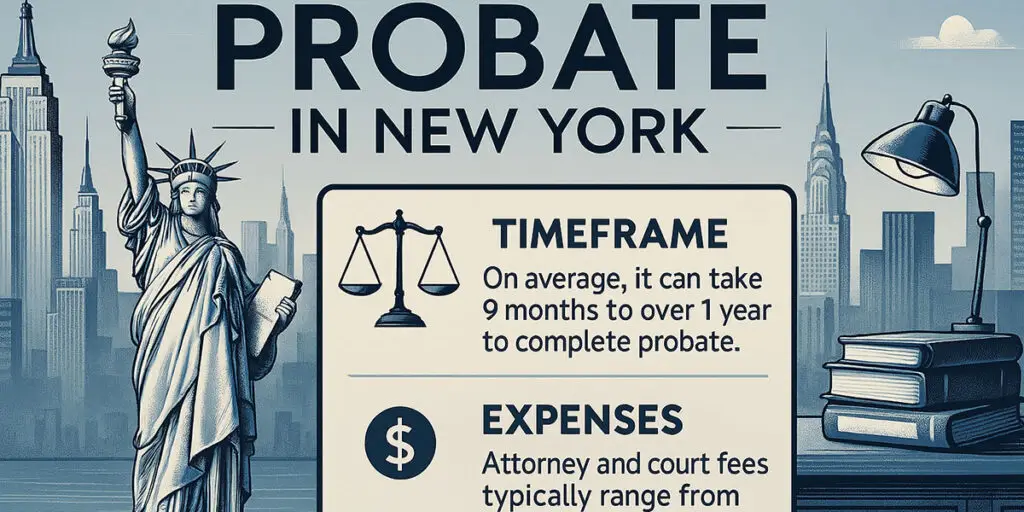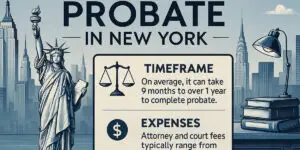Timelines and Costs of Probate in New York: What to Expect
When a loved one passes away, navigating the legal and financial complexities of probate can feel overwhelming. Two of the most common questions families have are: “How long will probate take?” and “How much will it cost?” Understanding the timelines and costs associated with probate in New York is essential for managing expectations and making informed decisions about estate administration. While every estate is unique and the precise figures can vary, this comprehensive guide will provide you with a realistic overview of the factors that influence probate timelines and costs in New York, offering insights to help you plan and prepare for the process. Having a plan with Morgan Legal Group is key!
This article will delve into the various factors that affect probate timelines, such as the complexity of the estate, the existence of a will, and any disputes that may arise. We’ll also break down the different types of costs associated with probate, including court fees, attorney fees, executor commissions, and other expenses. We will offer guidance to consider factors that many wouldn’t know affect these issues. Whether you are an executor, administrator, or beneficiary, this guide will provide valuable information and actionable advice for understanding and managing the timelines and costs of probate in New York.
Factors Affecting Probate Timelines in New York
The timeline for completing probate in New York can vary significantly depending on the specific circumstances of the estate. Some estates can be administered relatively quickly, while others can take months or even years to resolve. Several factors can influence the length of the probate process:
- **Existence and Validity of a Will:** If the deceased person had a valid will, the probate process is generally faster and simpler. If there is no will, the estate must be administered according to the laws of intestacy, which can be more complex and time-consuming. Additionally, a will that is contested will increase the probate time.
- **Complexity of the Estate:** The more complex the estate, the longer probate is likely to take. Complexities can arise from having multiple properties across the United States, stocks, bonds, debts, credits, insurance etc. The more you add to this process, the more the probate process will require. This is not just the size of the estate, but it’s complexity, as well.
- **Number of Beneficiaries and Heirs:** The more beneficiaries and heirs involved, the greater the potential for disputes and delays. Locating all interested parties and obtaining their consent can also add time to the process.
- **Creditor Claims:** If there are significant creditor claims against the estate, the probate process may be delayed while these claims are investigated and resolved. Disputing these charges could take longer!
- **Court Calendar and Backlog:** The Surrogate’s Court in each county has its own calendar and backlog of cases. The availability of court dates and the speed with which the court processes paperwork can significantly affect the overall timeline.
- **Cooperation of Interested Parties:** The probate process is more likely to be delayed if beneficiaries, heirs, or other interested parties are uncooperative or unwilling to provide necessary information. It is difficult to make progress in any legal proceedings without cooperation from all involved parties.
Given these factors, it’s difficult to provide a precise estimate of how long probate will take in any given case. However, as a general guideline, a simple probate proceeding with a valid will and no disputes can typically be completed in 9 months to 1.5 years, whereas a more complex estate can range in duration. Consult with a Morgan Legal Group’s probate expert to gain perspective on your particular circumstance.
Breaking Down the Costs of Probate in New York
The costs associated with probate in New York can vary depending on the size and complexity of the estate, as well as the specific services required. Some of the most common costs include:
- **Court Fees:** These fees are paid to the Surrogate’s Court for filing documents, obtaining citations, and other court-related expenses. The amount of the filing fee depends on the size of the estate.
- **Attorney Fees:** Attorney fees are typically the largest expense in a probate proceeding. Attorneys may charge hourly rates or flat fees for their services. The amount of the attorney fees will depend on the complexity of the estate, the amount of time the attorney spends on the case, and the attorney’s experience and expertise. This is a factor that depends highly on the firm that you work with.
- **Executor Commissions:** The executor is entitled to compensation for their services in administering the estate. The commission is based on the size of the estate and is set by law.
- **Appraisal Fees:** If the estate includes assets that need to be appraised, such as real estate, artwork, or business interests, you will need to pay for the cost of obtaining appraisals from qualified professionals.
- **Bond Premiums:** If the court requires the executor or administrator to obtain a bond, you will need to pay the premium for the bond. This is to be paid for legal documentation
- **Accounting Fees:** If the executor or administrator hires an accountant to prepare tax returns or other financial documents for the estate, you will need to pay the accounting fees.
- **Publication Costs:** In some cases, it may be necessary to publish a notice to creditors in a newspaper. You will need to pay for the cost of publishing the notice.
- **Miscellaneous Expenses:** There may be other miscellaneous expenses associated with probate, such as postage, copying costs, and travel expenses.
It’s difficult to provide a precise estimate of the total cost of probate, as it depends on the specific circumstances of the estate. However, as a general guideline, probate costs can range from 3% to 7% of the value of the estate. For large or complex estates, the costs can be even higher.
Understanding Executor Commissions in New York
As mentioned above, the executor is entitled to compensation for their services in administering the estate. The compensation, known as executor’s commissions, is based on the size of the estate. The commission rates are set by law in New York and are as follows:
- 5% of the first $100,000 of the estate
- 4% of the next $200,000 of the estate
- 3% of the next $700,000 of the estate
- 2.5% of the next $4,000,000 of the estate
- 2% of any amount above $5,000,000
It’s important to note that these commissions are not automatically granted. The executor must request them and they must be approved by the court. There may be occasions when these numbers are adjusted. This is to ensure that all expenses are accounted for before determining this, so it is important that the executor pays debts first. A probate lawyer can assist you in ensuring these are properly distributed, get in contact with Morgan Legal Group today.
For example, if the estate is worth $1 million, the executor’s commission would be calculated as follows:
- 5% of $100,000 = $5,000
- 4% of $200,000 = $8,000
- 3% of $700,000 = $21,000
- Total commission = $34,000
The executor is entitled to receive their commission after the estate has been administered and the assets have been distributed to the beneficiaries. The executor must file an accounting with the court and obtain approval before receiving their commission.
Strategies for Minimizing Probate Costs and Timelines
While it’s impossible to completely eliminate the costs and time associated with probate, there are several strategies that can help minimize them:
- **Create a Comprehensive Estate Plan:** A well-designed estate plan that includes a will, trusts, and other legal documents can help streamline the probate process and reduce the potential for disputes.
- **Avoid Intestacy:** Dying without a will can significantly increase the costs and time associated with probate. Creating a will ensures that your assets will be distributed according to your wishes and avoids the complexities of intestacy law.
- **Use Probate Avoidance Techniques:** As discussed earlier, techniques such as revocable living trusts, joint ownership, and beneficiary designations can help transfer assets outside of the probate process.
- **Choose a Qualified Executor:** Selecting a qualified and experienced executor can help ensure that the estate is administered efficiently and effectively. A responsible executor has the necessary skills and time!
- **Work with an Experienced Probate Attorney:** An experienced probate attorney can help you navigate the probate process, avoid common mistakes, and protect your rights and interests. A probate lawyer can advise you on different strategies to ensure you come in at, or under budget with your legal costs.
- **Communicate Effectively with Family Members:** Open and honest communication with family members can help prevent disputes and facilitate a smoother probate process. This is essential and can help avoid difficult issues!
- **Be Organized and Efficient:** Being organized and efficient in gathering documents, paying bills, and managing assets can help expedite the probate process and reduce costs.
The Role of the Surrogate’s Court in Managing Probate Timelines and Costs
The Surrogate’s Court plays a critical role in managing probate timelines and costs. The court is responsible for overseeing the administration of estates and ensuring that they are handled efficiently and in accordance with the law.
Some ways in which the Surrogate’s Court helps manage probate timelines and costs include:
- **Setting Deadlines and Timeframes:** The court sets deadlines for various stages of the probate process, such as filing the inventory of assets, paying debts and taxes, and distributing assets to beneficiaries. These deadlines help to keep the probate process moving forward in a timely manner.
- **Providing Oversight and Supervision:** The court provides oversight and supervision of the executor or administrator to ensure that they are fulfilling their duties properly and managing the estate assets responsibly.
- **Resolving Disputes:** The court is responsible for resolving any disputes that may arise during the probate process, such as will contests, asset valuation disputes, or creditor claims.
- **Reviewing and Approving Accountings:** The court reviews and approves the accountings filed by the executor or administrator to ensure that the estate assets have been properly managed and distributed.
The Surrogate’s Court is committed to ensuring that estates are administered efficiently and fairly. However, the court’s resources are limited, and the volume of cases it handles can sometimes lead to delays. It’s important to be patient and to work with an experienced probate attorney who can help you navigate the court system and advocate for your interests. Find a team in New York, Long Island, and NYC today!
The Impact of COVID-19 on Probate Timelines in New York
The COVID-19 pandemic has had a significant impact on many aspects of the legal system, including probate. The pandemic has caused court closures, delays in processing paperwork, and disruptions to the normal probate process. This has resulted in longer timelines for completing probate in many cases.
Some of the specific ways in which COVID-19 has impacted probate timelines include:
- **Court Closures:** Many Surrogate’s Courts in New York have been closed or have operated with limited hours due to the pandemic. This has made it difficult to file documents, schedule hearings, and conduct other court-related business.
- **Delays in Processing Paperwork:** Even when the courts are open, there have been significant delays in processing paperwork due to staff shortages and increased workloads. This can delay the appointment of an executor or administrator and the distribution of assets to beneficiaries.
- **Disruptions to Normal Procedures:** The pandemic has forced many courts to adopt new procedures for conducting hearings and other court proceedings. This has created uncertainty and confusion for many individuals involved in probate.
While the pandemic has created challenges for the probate process, the courts are working to adapt to the new circumstances and to minimize the delays. It’s important to be patient and to work with an experienced probate attorney who can help you navigate the challenges and ensure that your case is handled as efficiently as possible.
Planning Ahead: Why a Well-Drafted Estate Plan is Key
The best way to manage the timelines and costs of probate is to plan ahead and create a comprehensive estate plan. A well-drafted estate plan can help you avoid probate altogether or at least minimize the amount of assets that are subject to probate. It can also help to reduce the potential for disputes among family members and ensure that your wishes are honored.
Some of the key components of a comprehensive estate plan include:
- **A Will:** A will is a legal document that specifies how you want your assets to be distributed after your death. Having a will ensures that your assets will be distributed according to your wishes and avoids the complexities of intestacy law.
- **Trusts:** Trusts can be used to avoid probate, minimize estate taxes, and provide for family members with special needs. There are many different types of trusts, each with its own unique features and benefits.
- **Powers of Attorney:** A power of attorney is a legal document that authorizes someone to act on your behalf in financial matters if you become incapacitated.
- **Healthcare Proxies:** A healthcare proxy is a legal document that allows you to appoint someone to make medical decisions on your behalf if you are unable to do so yourself.
- **Beneficiary Designations:** Reviewing and updating your beneficiary designations for your life insurance policies, retirement accounts, and other assets ensures that these assets will be distributed according to your wishes.
Creating an estate plan is an important step in protecting your assets and providing for your loved ones. It’s important to work with an experienced estate planning attorney who can help you develop a customized plan that meets your specific needs and goals.
Taking the Next Step: Contact Morgan Legal Group Today
Understanding the timelines and costs of probate in New York is essential for managing expectations and making informed decisions about estate administration. While the probate process can be complex and time-consuming, there are strategies that can help minimize the burdens on your family. At Morgan Legal Group, we are dedicated to providing comprehensive probate services to families throughout New York City and beyond. We know how important it is to consider your money, so Book Appointment Services today! Feel free to check out additional services from our firm: Reach out to our group in Brooklyn, the Bronx, and Queens
Check us out in these additional areas: Staten Island, Westchester, Albany, Suffolk County, Ulster County, and Orange County.
Check us out: sample The NY Courts have additional resources for you.









